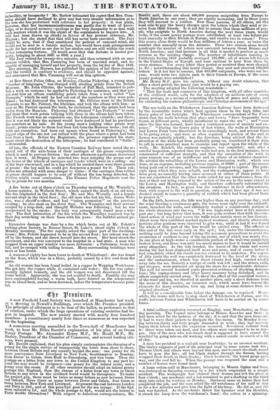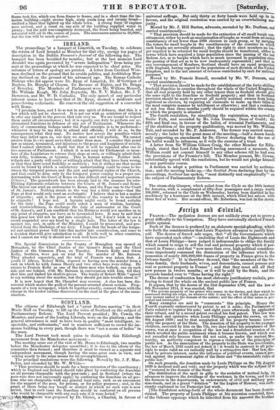Ctt rruniurro.
A new Freehold Land Society was launched at Manchester last week, at a diecting in Newell's Buildings, over which Mr. Prentice presided. The principle of allotment is to be that of the ballot, in preference to that of rotation, wider which the large operations of existing societies had be- gun to languish. • The new society started with nearly four hundred members : a constituency nearly four times as numerous as was expected for the beginning.
A numerous meeting assembled in the Town-hall of Manchester last week, to hear Mr. Elihn Burritt's explanation of his plan of an Ocean Penny Postage. Mr. Alexander Henry M.P., Mr. Heald M.P., Mr. Bazley, President of the Chamber of Commerce, and several leading citi- zens, were present.
Mr. Burritt explained, that his plan simply contemplates the charging of a penny for the single service of transporting the letter from shore to shore, -between Great Britain and any country beyond the seas; one penny for its niece conveyance from Liverpool to New York, Southampton to Bombay, from Dover to Calais, from Hull to Petersburg, and vice versa. Thus the postage on a letter from any town in the United Kingdom to any part be- yond the seas would be twopence—one penny for the inland route, and a penny over the ocean. If all other countries should adopt an inland penny postage like England, then the charge of a letter from any town in Great Britain to any town in the civilized world would be threepence. To make the project pay, there must be twice as many letters as now between Dover and Ostend, three times as many between Dover and Calais, four times as manz.between New York and Liverpool. At present the cost between London and rails is 10d., and of this price 6.d. goes for the sea voyage. If the 61d. were reduced told., and the whole postage to 41d., would not the letters to Paris double themselves ? With respect to American correspondence, Mr.
Burritt said, there are about 400,000 persons emigrating from Europe to North America in one year ; they are rapidly increasing, and in three years they will amount to a million. Now these persons, of all others, are the least able to pay the heavy charges upon the letters which they send or re- ceive from their friends. Is it not fair to assume that these millions of peo- ple who emigrate to North America during the next three years, would write, if the ocean penny postage were established, at least two letters per head annually to their friends in Europe, and receive two in return ? From this source alone there would ,be four millions of letters a year, or twice the number that annually gross the Atlantic. These two sources alone would Quadruple the number of letters now conveyed between Great Britain and North America ; and that increase is all that is needed to produce as much revenue as the existing charge. The number of inhabitants residing in California during 1850 probably averaged 125,000; all of whom left friends in the Malted States or Europe, and were anxious to hear from them by every steamer. For every letter they posted or received they were charged Is. 8d.; notwithstanding this heavy charge, they gent and received 150,000 letters. Is it not fair to assume, that 400,000 emigrants, who went out last year, would write two letters each to their friends in Europe, if the ocean penny postage were established ? Mr. Henry M.P. gave his opinion, without any doubt whatever, that after a short period, the penny rate would be a paying one. The meeting adopted the following resolution- " That the trade and commerce of this kingdom, with all other countries of the civilized world, calls for the adoption of an uniform rate of ocean penny postage, as a means of cementing the bonds of peace and amity, and for extending the various philanthropic and Christian movements of tho age."
The sea-walls on the Whitehaven Junction Railway have been destroyed by the irresistible waves which beat against them in the high tides and heavy gales of last fortnight. The Whitehaven correspondent of the Times states that the walls between that place and Lowca "have frequently been found, at different parts, wholly insufficient to resist the sea" ; and ever duce the line was formed, have been a continued source of anxiety and ex- pense." "During the heavy gales of last winter, the walls at Harrington and Lewes Point were discovered to be exceedingly weak, and several times to be giving away ; and were as often repaired. A portion of the wall at Lewes was entirely rebuilt ; but the directors, being advised that the de- struction of the walls had been gradually going on, considered it their duty to call in some practical man to examine and report upon the whole of the walls. Mr. Rendell, the eminent engineer, was consulted ; and, after a careful inspection, reported that the walls had not, in the first instance, been constructed of suicient strength, and that the execution of the work ill some respects was of an indifferent and in others of an inferior character. He advised the rebuilding of the Lowca and Harrington walls; which was done, at an expense, including previous repairs, of 6000!.; part of the money being paid out of revenue, and the remainder charged to capital. The prin- ciple upon which they were rebuilt, and the workmanship, appear to hal.° been good, no casualty having since occurred at either of these points. It was not considered that the other walls called for any interference, from the fact of their not being exposed to the action of the sea to the same extent as the Lowca and Harrington walls, and therefore sufficiently substantial for the situation. In fact, so great was the confidence in their adequateness, that, with respect to the wall in question, only a short time ago it was not deemed unsafe to remove a quantity of rubbish which had been placed there to protect it." On the 24th, however, the tide was higher than on any previous day ; rind the wind blowing a continuous gale, the waves went right over the embanit- meat, breached the walls, and ultimately washed a considerable portion of the whole structure into the sea. "It was high-water here at five minutes past one ; but long before that hour, it was quite evident that with the com- bined action of wind and waves the walls must sustain more or loss damage. About noon they exhibited marked signs of weakness, and shortly afterwards portions after portions were observed to give way, carried at last it was feared
the whole of this part of the line would be ed away. The officials at this end of the line were early on the spot ; but, under the circumstances, nothing could be done beyond taking the necessary precautions to avoid the occurrence of accident to any of the up-trains, one of which was nearly due. Iii one place at high-water a considerable portion of the wall was completely broken down, and there was only too much reason to fear it would be carried away altogether. As the tide receded, the havoo of the winds and waves during the last hour displayed itself more and more, and of course before it had completely ebbed the result was too evident to be mistaken. For a space of fifty yards the wall was completely destroyed to the level of the shore, and the embankment, which was about twenty feet high, carried wholly away into the sea. Scarcely a vestige of earth was left ; end the stones, rails, and sleepers, were scattered all along the shore for a considerable distance. The wall for several hundred yards presented evidence of shocking destruc- tion; the coping-stones and other heavy masonry being dislodged and in -others carried away. To show the effect of the combined violence of the wind and sea, we observed at another place, only a short distance from the scene of this disaster, an immense rock, which must have braved the elements for many centuries, torn up, and lying at some distance from its original situation."
It will be a considerable time before the damage-can be repaired. Mean- while, the trains will have to stop short of Whitehaven at Parton' and the traffic between Parton and Whitehaven will have to be carried on by omni- buses.
A fatal colliery-explosion occurred at Ringley, near Manchester, on Mon- day morning. The Cannel mine belongs to Messrs. Knowles and Stott : it had been noted for the badness of the air ; it is said that the men frequent- ly had to wave their jackets to dissipate the fire-damp. On Monday morn- ing between thirty and forty people descended to work ; they had scarcely begun their labour when the explosion occurred. Seventeen suffered from it : three were taken out dead, and five others were considered to be in dan- ger. One of the men who was struck dead is supposed to have caused the mischief by going into an old working with a naked candle in search of a bit of clay.
A man has perished in a coal-pit near Ironbridge, by an unusual accident. The timber supports of part of the principal road by some means took fire ; Thomas Clark and others were beyond this spot, and to reach the shaft would have to pass the fire; all but Clark dashed through the flames, having wrapped their heads in their frocks ; Clark hesitated, the burnt props gave way, and the roof fell in, When the passage was reopened the man and a number of horses were found dead.
A large cotton-mill at Manchester, belonging to Messrs. Ogden and 13011s, -was destroyed on Saturday evening by a fire which originated in a simple accident. The workpeople had cleaned their frames and left the place at four o'clock-; one mechanic and a lad remained to put a shafting in the third story into order for working on Monday. Darkness came on before they had completed the job, and the man asked the old watchman of the mill to step in for a few minutes and give him the light of his lamp. He did so; and the task was finished. As the mechanic threw his hammer over his shoulder, it struck the lamp from the watchman's hand : the cotton in a spinning- frame took fire, which ran from frame to frame, and in a short time the im- mense building—eight stories high, sixty yards long and twenty broad— emitted a blaze that lighted up the whole town. A strong force of engines soon arrived, and a canal on one side of the building supplied water in plenty ; but the mill was completely destroyed, the floors being boarded, and saturated with oil in the course of years. The insurances amount to 26,0001., but the loss will be much greater.



























 Previous page
Previous page